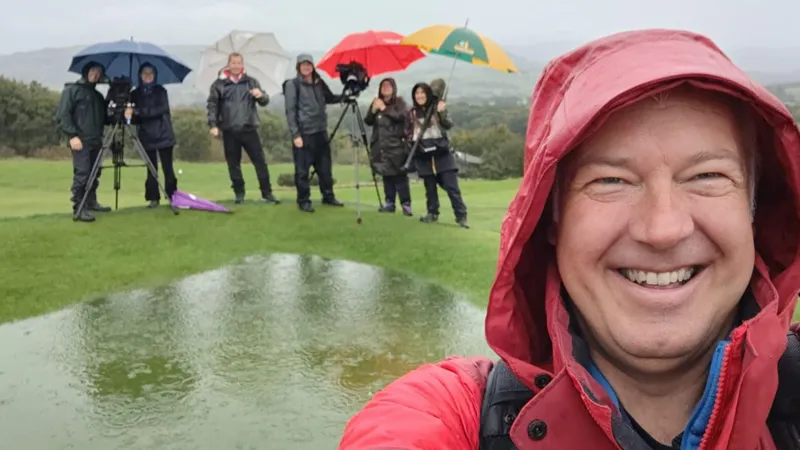How rain can make you happier and healthier
Apart from a few sunny days recently, it feels like it has not stopped raining for months and months.

But did you know that going for a walk on a rainy day can be good for you?
Scientists have discovered that rain can make us happy and improve our mental health.
On average in the UK there are 159 days of rain every year, although here in Wales, we have 173, and so far in 2024 we have had more wet ones than dry.
When we inhale them, it is thought they can help to relieve stress and even boost our energy levels.
After a very wet winter, Wales has already exceeded its normal spring rainfall quota.
A total of 294mm (11.5in) of Welsh rain was recorded in March and April. For the whole of March, April and May, we would normally expect to have 278mm (10.9in).
Why has it been so wet?
There are a number of reasons why we are seeing so much of the wet stuff.
El Niño, a warm sea current in the Pacific Ocean, could be disrupting the jet stream.
This is a ribbon of strong winds high in the atmosphere which steers rain-bearing weather systems towards the UK.
Sea surface temperatures in the Atlantic are also at record levels, which means low pressure systems have more energy, resulting in higher rainfall.
Climate change is also likely to be playing its part.
With temperatures rising, warmer air can hold more moisture, so when it rains, the rain is heavier and storms are more intense.
Why walk in the rain?
Many of us avoid going out when it is raining, but there could be some good scientific reasons why we should change the way we think about a downpour.
Walking in the rain, or after it has been raining, can actually be good for your body and your mind.
Some scientists think it is all down to negative ions. These are odourless, invisible molecules which are created in nature near moving water.
As well as rain, they can come from waterfalls, waves in the sea and even morning dew and mist.
Dr Niek Buurma, of Cardiff University’s School of Chemistry, said one way they can be formed is by water, such as raindrops, hitting the ground.
"When drops of water hit a hard surface, they break up and in that process, the drops of water, the smaller drops of water, pick up a charge," he said.
"That charge, if it's negative, has additional electrons and those additional electrons can be picked up by molecules in the air, such as oxygen and carbon dioxide and that's how the negative ions are formed."
Research is taking place into the effects of negative ions, but it is thought they may boost our mood, relieve stress and give us more energy.
"There are quite a lot of scientific studies that suggest that inhaling these negative ions has a positive effect on your health," said Dr Buurma.
"Nobody really knows exactly why that happens. But there are clear indications that people feel more positive after inhaling negative ions.
"There are indications from the scientific literature that exposure to negative ions lifts your mood. It can be used to treat a seasonal affective disorder.
"There is a lot more research to be done because nobody understands exactly why it works. But there does seem to be a correlation."
The air is cleaner during rainfall and after it because raindrops wash dirty particles out of the atmosphere. There is also that unmistakeable smell when it rains after a long period of dry weather.
The earthy scent is called petrichor, from the Greek words petra, meaning "stone", and ichor, meaning "the fluid that flows in the veins of the gods".
Petrichor includes a chemical called geosmin, which is made by bacteria in soil. Inhaling it in the air can have a calming effect.
"It doesn’t have to be walking, it can be a bike ride, a run, but it could just be an amble around your local area," she said.
"You’ve got the sound, the sensation of it hitting your face, it's very relaxing.
"It’s washed away all the allergens and the dust in the air, it's been good for us to breathe. We’ve probably walked a bit faster, so we've probably burnt off a few more calories.
"We’ve engaged our muscles more, because you worry more about slipping on the wet floor.
"It’s the social aspect as well. If you're out in your local community, your local green spaces or maybe a bit further afield, you get those social benefits of seeing other people, having a chat with them, saying hello.
"That's really good to help you connect to the place that you're in, the environment and you get that nature connection as well.
"It’s really important... whether you're 18 months, 18 years old or 80 years old, that you get out into your natural environment."
-bbc







